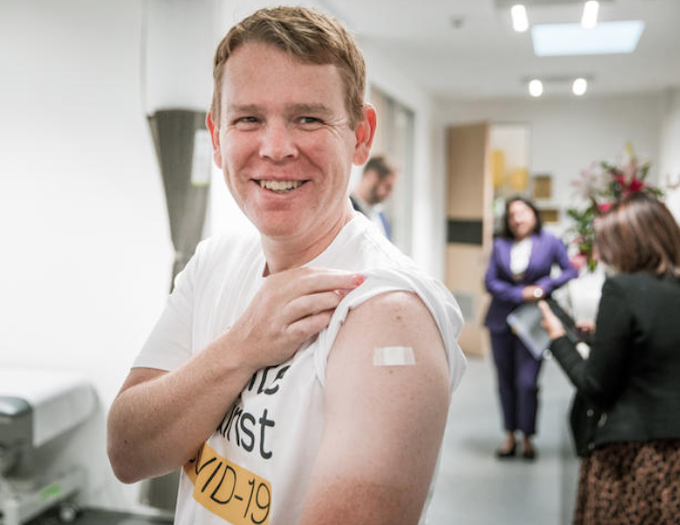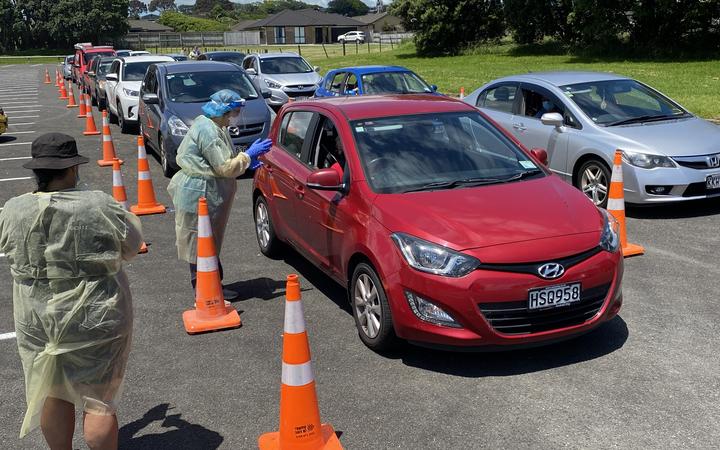
People should do everything they can against omicron, but it is likely large numbers will be infected, New Zealand’s Covid-19 Response Minister says.
Speaking to RNZ Morning Report today, Chris Hipkins said masks, booster shots, isolating and good preparation for isolation were all vital steps people should take to slow the spread of the virus.
But “the cat is out of the bag to some extent, and we know that we’re likely to see more cases, and potentially significantly more cases associated with these ones.
- LISTEN TO RNZ MORNING REPORT: ‘Our main message is once you’re eligible come forward and get your booster dose’ – Covid-19 Response Minister Chris Hipkins (duration 7:38
- READ MORE: Arrests during Samoa covid lockdown
- Up to half of NZ population could become infected with omicron – modeller
- Other NZ covid outbreak reports
“There’s no silver bullet we are going to experience a large number of cases.”
The entire country is now in the red Covid-19 Framework setting, with the news announced yesterday that omicron is likely spreading in the community.
“There are some unavoidable realities about this, and one of those unavoidable realities is that we will see omicron spreading much more quickly than previous variants of the virus,” Hipkins said.
Booster vaccinations were going strongly, he said, but there was still a chunk of those eligible who weren’t getting them as soon as they could.
“Our main message is once you’re eligible come forward and get your booster dose.”
Covid-19 vaccination providers have been warned to prepare for high demand today in response to the news of omicron spread in the community, and have been asked to consider staying open late to meet demand.
“We do know from our delta experience that when an outbreak is happening or is imminent, that drives a lot more [vaccinations].”

Making people eligible for the booster three months after their second Covid-19 shot, rather than the current four months would only shift about 100,000 people forward, Hipkins said, and while it had been considered, the benefit was not considered worthwhile at this stage.
Testing strategy shifts expected
Hipkins said it was expected that as the situation changed, the public will be asked to make changes in their response.
In this future this was likely to include whether those experiencing symptoms get tested.
Right now, Hipkins said, the government wanted everyone to continue to get tested if they had any cold or flu symptoms, or if they were a contact. But if daily case numbers rose considerably not everyone would be tested.
“A lot more people will get it, but many of those people — particularly those who’ve been boosted … are likely to be able to recover by staying at home,” he said.
“There will be some … further down the line … that we’ll be saying: ‘Don’t worry about getting tested … just stay home and get better’.”
National Party leader Christopher Luxon told Morning Report the 4.6 million rapid antigen test kits (RATs) currently in the country was an alarmingly low number and the government should have acted sooner to stockpile them and authorise private importing.

“We need them now, and we needed them months ago. Now we’re in a place where it’s quite an urgent situation,” Luxon said.
“Many countries … you actually upload the result of your rapid antigen test you do at home … and that’s how the government tracks what’s actually happening with cases.”
Hipkins said there were widespread international issues with RAT supplies; “Countries that are relying on them are now running out.”
But before Christmas the government had begun efforts to purchase as many as possible
“We know that as this situation unfolds we’re going to want to use rapid antigen testing a lot more.”
Luxon said the National party supported the government’s shift to the red framework setting “reluctantly”.
But he said the government must act more quickly at adopting international learning in how to respond to the virus: “We’ve got to keep going forward.”
He said once daily case numbers rose drastically, managed isolation and quarantine facilities (MIQ) at the border could become redundant. If that happens, National want the government to reconsider MIQ, and in particular to allow all New Zealanders overseas to return without having to go through it.
Mask use tutorials
Hipkins said experts strongly advised surgical masks were still the best for the public to use, and: “We’ve got plenty of those available.”
He said while testing showed N95 masks were more effective against Covid-19, in real world application it was not that simple.
“An N95 mask needs to be the right fit, otherwise it can be potentially less effective. If you buy the wrong shape or the wrong size and it doesn’t sit properly, then actually the extra protection that you could be getting from that – you won’t necessarily get that.”
The country has plenty of N95 masks for health workers and frontline workers in stock, and they were given professional fitting tutorials and had their fit checked by others.
Hipkins said the government would enact any new advice around masks and omicron quickly as it came in, but research on masks was still evolving.
Hipkins did not have any new updates on the Nelson Tasman region cluster of cases at this stage.
This article is republished under a community partnership agreement with RNZ.












































